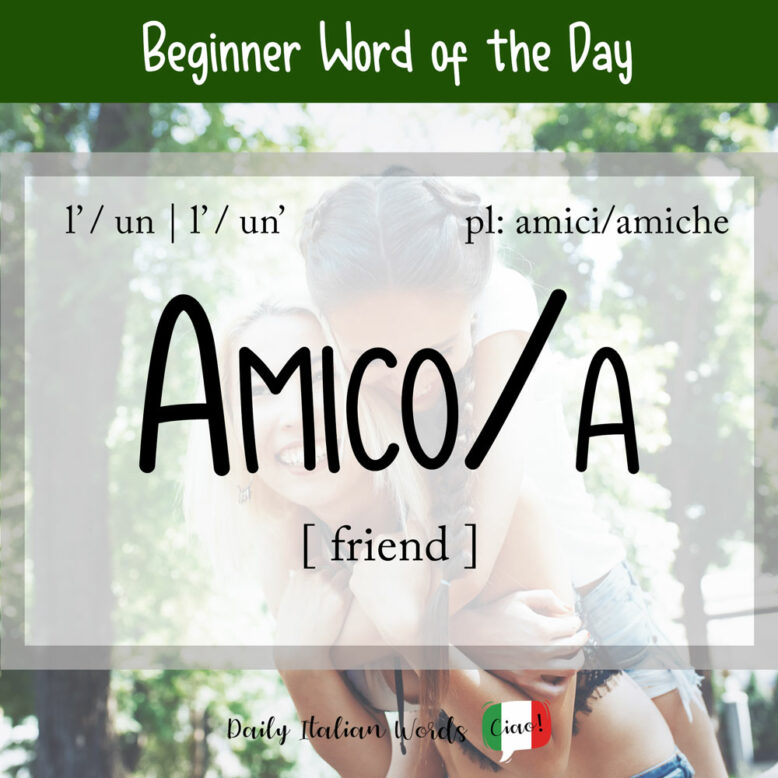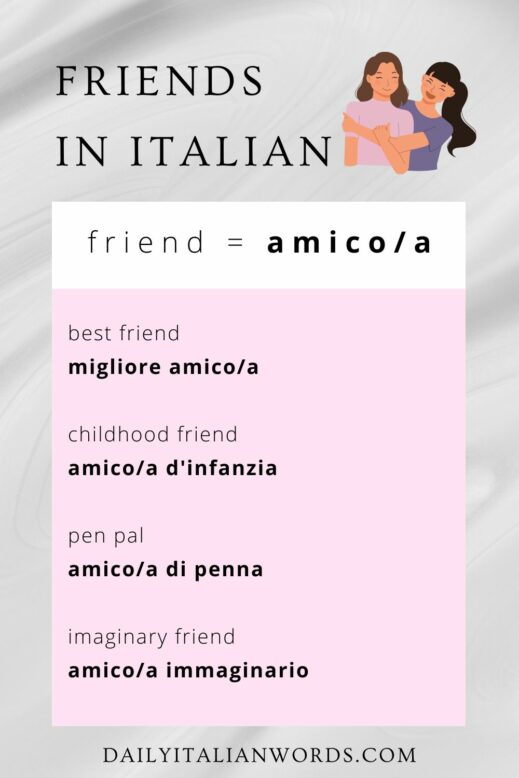Few things in life are as important as the friendships we forge. Sometimes you may meet a new friend and feel as if you’ve known them all your life, whereas other friendships take much longer to develop. Many friendships are fleeting, while a precious few last a lifetime.

How to Say ‘Friend’ in Italian
The word for friend in Italian is amico (when referring to a male friend or the generic concept) or amica (when referring to a female friend). The plural forms are amici (male friends) and amiche (female friends) respectively.
Grazie per essermi amico / amica.
Thanks for being my friend.
The definite and indefinite articles these words take are as follows:
- l’amico = the friend (m.)
- l’amica = the friend (f.)
- gli amici = the friends (m.)
- le amiche = the friends (f.)
- un amico = a friend (m.)
- un’amica = a friend (f.)
- degli amici = (some) friends (m.)
- delle amiche = (some) friends (f.)
Friendship is referred to as amicizia whereas the adjective friendly can be translated as either amichevole or amico.
Paolo è una persona molto amichevole. Piace a tutti.
Paolo is a very friendly person. Everyone likes him.
Che bello vedere un volto amico!
How nice to see a friendly face!
When you become friends with someone in Italy, you can use one of two expressions:
- fare amicizia con (Lit: to make a friendship with)
- diventare amico di (Lit: to become a friend of)
Ho fatto amicizia con tutti alla festa!
I made friends with everyone at the party!
Siamo diventati amici sin da subito.
We became friends right away.
When talking about social media networks such as Facebook, Italians often use the expression chiedere l’amicizia a qualcuno which means to request the friendship of someone.
Ieri gli ho chiesto l’amicizia su Facebook. Lui me l’ha accettata ma non mi ha ancora scritto.
Yesterday I asked him to become friends on Facebook. He accepted but he hasn’t written to me yet.

Amichetto/a is the diminutive form of amico/a and it literally means little friend. You can use it to talk about a young child‘s friend for example. It can also refer to a budding love interest, meant in an innocent and friendly way.
Sei contento di tornare a scuola domani? Rivedrai tutti i tuoi amichetti!
Are you happy to go back to school tomorrow? You’ll see all your friends again!
A quanto pare Giulio ha un’amichetta a scuola, o almeno così dice la maestra!
It looks like Giulio has a girlfriend at school, or at least that is what the teacher is saying!
Another common word that can sometimes mean friend or buddy is compagno, although it is more often translated as companion, comrade or even romantic partner depending on the context.
- compagno di viaggio = travel buddy
- compagno di bisboccia = drinking buddy
- compagno di classe = classmate
- compagno di merende = literally it means snack or break buddy, but now it mainly translates as partner in crime
- compagno di banco = desk mate
- il compagno di Laura = Laura’s boyfriend
- compagno di vita = life partner
Amicone (lit. big friend) is used for someone who is friendly with everyone, or in reference to someone you’re very good friends with.
Io e Giancarlo siamo amiconi da una vita.
Giancarlo and I have been very good friends for a lifetime.
The word friend in English can also be used as a synonym for patron or supporter (e.g. Friend of the Arts). In this sense, you would use the word protettore or mecenate.
Below are some other useful terms that contain the word amico:
- un amico immaginario = an imaginary friend
- un amico in comune = a friend in common
- un amico di penna = a pen pal
- un amico di vecchia data = an old friend
- un amico del cuore = a bosom buddy
- un amico intimo = a close friend
- un caro amico = a dear friend
- un grande amico = a great friend
- il mio amico = my friend
- il mio migliore amico = my best friend
In English, you can also address someone using my friend as a warning or a threat. In Italian, the closest translation is caro mio or bello mio.
Basta solo che aspetti e vedrai, bello mio!
Oh, just you wait and see, my friend!
Finally, the expression farselo amico is appropriate when one party wants to curry favour with another, as in the example below:
Il giovane principe vuole farsi amico il popolo.
The young prince wants to ingratiate himself with the public.
Trivia:
One of the most celebrated Italian novelists is Elena Ferrante who penned the four-part series called The Neopolitan Novels. The first book in the series is called L’Amica Geniale or My Brilliant Friend. Due to its popularity, it was later adapted into a hit HBO series of the same name.
Despite her international fame, Elena Ferrante has managed to keep her identity secret since the publication of her first novel in the early 1990s!
Below you can watch a scene from the series, which features Italian subtitles because most of the dialogue in the show is spoken in the Neapolitan dialect.
One of the most famous idioms containing the word amico is:
- Chi trova un amico trova un tesoro. = He who finds a friend finds a treasure.
This is also the title of one of the many films made by the famous comedy duo Bud Spencer (real name Carlo Pedersoli) and Terrence Hill (real name Mario Girotti).
In Chi trova un amico trova un tesoro, Alan (Hill) hides in Charlie (Spencer)’s boat as he heads out on a solitary cruise sponsored by a jam company. After an initial falling out, they become good friends and help a small indigenous population fight a band of silly pirates on a tropical island. Below you can see a funny fight scene, called a scazzotata in Italian. These scenes are a trademark of Hill/Spencer films.
Many songs have been written about friends and friendship. Here is a very beautiful one by Lucio Dalla entitled Amici.

Heather Broster is a graduate with honours in linguistics from the University of Western Ontario. She is an aspiring polyglot, proficient in English and Italian, as well as Japanese, Welsh, and French to varying degrees of fluency. Originally from Toronto, Heather has resided in various countries, notably Italy for a period of six years. Her primary focus lies in the fields of language acquisition, education, and bilingual instruction.


